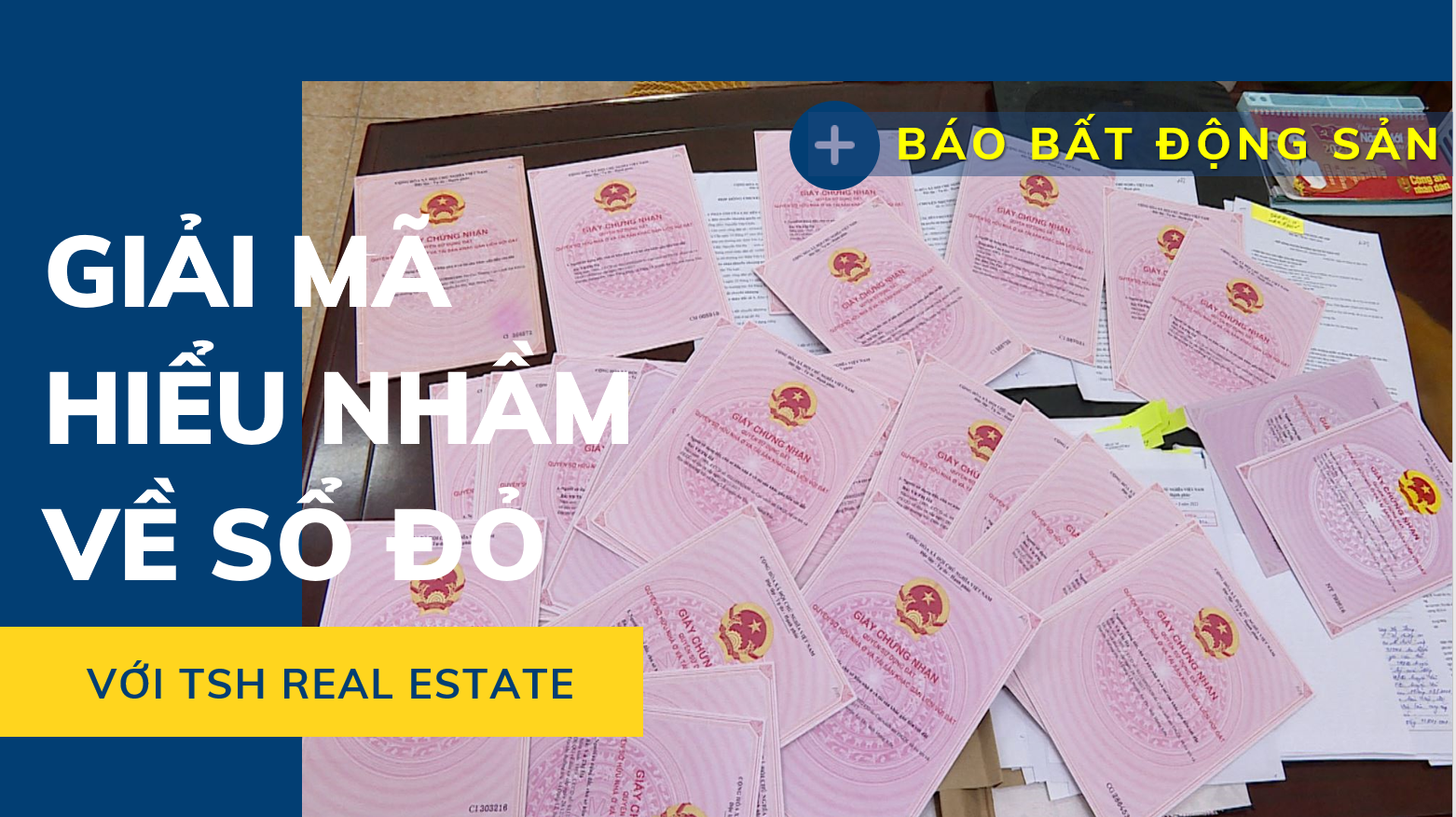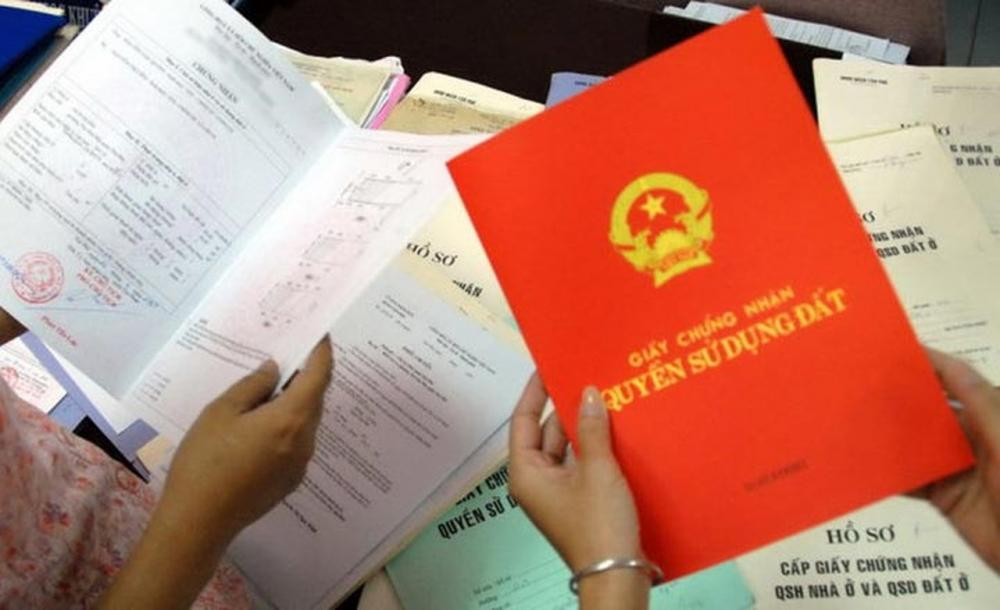Red book is the word that people often use to call Land Use Rights Certificate based on the color of the Certificate;
Clause 16, Article 3 of the 2013 Land Law identifies this as an important legal deed verifying real estate ownership. However, many people still have misconceptions about the regulations related to red books.
Let’s demistify these misunderstandings with TSH.

1. Is Red book property?
1. Is Red book property?
Property is object, money, valuable paper and property right. Property includes immovable property and movable property. Real estate and movable property can be existing assets and assets formed in the future. So, is a land use right certificate (red book) an asset?
o Pursuant to Clause 1, Article 105 of the 2015 Civil Code, property comprises objects, money, valuable papers and property rights. In other words, property includes immovable property (eg houses, land, buildings) and movable property (property that can be moved mechanically such as money, valuable papers...). At this point, many people will immediately classify the Land Use Rights Certificate into the group of "valuable papers", thereby thinking that the red book is a type of property.
o However, the concept of "Valuable Papers" as defined in Clause 8, Article 6 of the 2010 Vietnam State Bank Law is the basis for confirming the debt repayment obligation between the organization issuing valuable papers and the subject owning valuable papers. This debt repayment must be agreed upon within a certain period of time while ensuring interest payment condition and other conditions.
o Specifically, there are 5 types of valuable papers as follows:
- Checks, bills of exchange or other negotiable instruments.
- Government/corporate bonds, stocks, promissory notes.
- T-bills, bills of exchange, government/corporate bonds and other instruments giving rise to other debt repayment obligations.
- Types of securities are specified in Clause 1, Article 4 of the 2019 Securities Law.
- Corporate bonds as prescribed in Article 4, Decree No. 53/2020/ND-CP.
Comparing with the above regulations, Certificates of land use rights, ownership of houses and other assets attached to land are not considered valuable papers. That means the red book is not a property.

2. If you lose your red book, you cannot get it back
Due to the misunderstanding that the red book is a valuable property, when people accidentally lose or have their land use rights certificate stolen, they are often very worried and afraid that someone else will take away their ownership rights to their own real estate.
Meanwhile, the red book is only a legal document recording land use rights and ownership of assets attached to legal land (eg: houses, construction works), not property. Therefore, whether it is accidentally lost or stolen or the red book is exchanged, people only lose documents recording property rights, not property. They can completely request the competent authority to re-issue them a land use right certificate after declaring the loss of the red book at the People's Committee of the commune, ward or town.
Information about people's lost red books will be posted for 30 days at the People's Committee where the land is located for search purposes. After the listing period expires without finding out it, people need to carry out procedures to apply for a lost red book at the Land Registration Authority.
3. Having a red book in hand means being able to pledge, mortage it.
According to the provisions of Article 309 of the 2015 Civil Code: "Pledge of property means the delivery by one party of property under its ownership to another party as security for the performance of an obligation."
According to the analysis in part I, the Red Book is not a property used to ensure the performance of obligations, so it cannot be pledged, but the Red Book can only be mortgaged.
According to the provisions of Clause 1, Article 317 of the 2015 Civil Code: “Mortgage of property means the use by one party of property under the ownership of the obligor as security for the performance of an obligation to the other party without transferring such property to the mortgagee
Article 188 of the 2013 Land Law stipulates: "Land users may exercise the rights to convert, transfer, lease, sublease, inherit, donate, and mortgage land use rights; Contribute capital using land use rights when the following conditions are met: Have a certificate, except for the case specified in Clause 3, Article 186 and the case of inheritance specified in Clause 1, Article 168 of this law; The land is not in dispute; Land use rights are not distrained to ensure judgment enforcement; during the term of land use".
According to the above regulations, only legal land users recognized by law and whose names are on the Land Use Rights Certificate can carry out transactions related to land use rights. The person who picks up the Land Use Rights Certificate who is not the land user will not be able to mortgage this Land Use Rights Certificate. If the mortgage of land use rights at a bank does not have the signature or authorization of the land user, the mortgage transaction is invalid because it does not meet the conditions for validity in terms of subject matter.
4. Only the person whose name is on the red book is the Owner.
According to Clause 1, Article 33 of the 2014 Law on Marriage and Family, the land use rights obtained by a spouse after marriage shall be common property of husband and wife, unless they are separately inherited by, or given to a spouse or are obtained through transactions made with separate property.
Thus, in case the red book is under the name of only the spouse but the money used to buy the house is the common property of the couple, then that house and land is the common property of the husband and wife (even if only one person's name is on the red book).
Here are 4 common misunderstandings about the Red Book. We hope that the information TSH shares is useful to you.
Để chọn cho mình một căn hộ như mong muốn không phải là chuyện dễ dàng. Khi thời điểm hiện nay đã có rất nhiều dự án căn hộ, chung cư mọc lên với đầy đủ những lợi thế và...
vfđbgdf